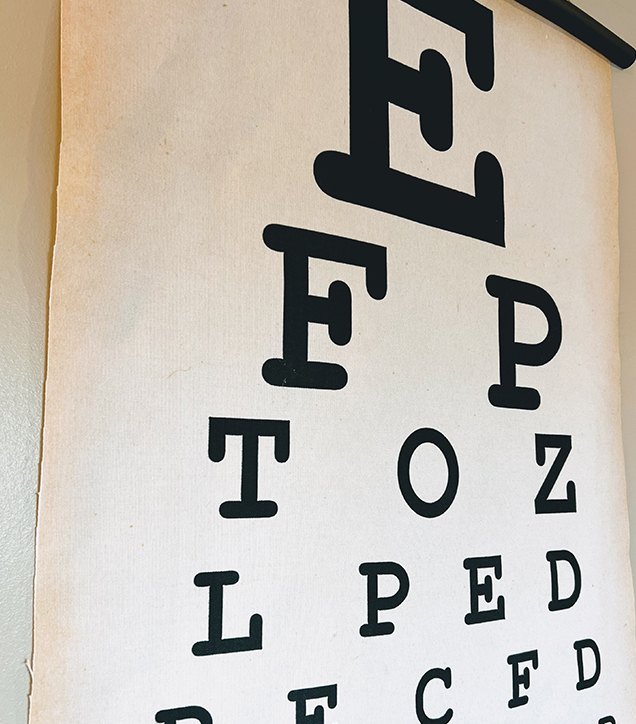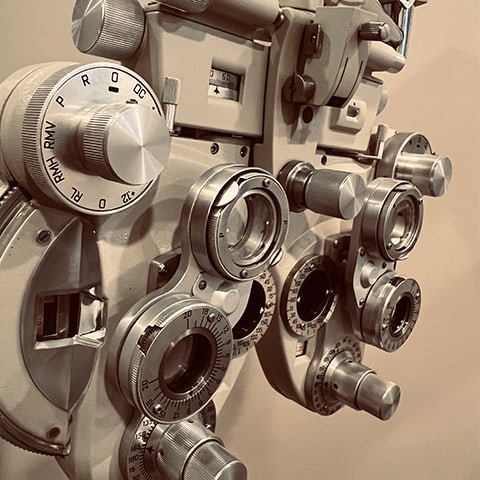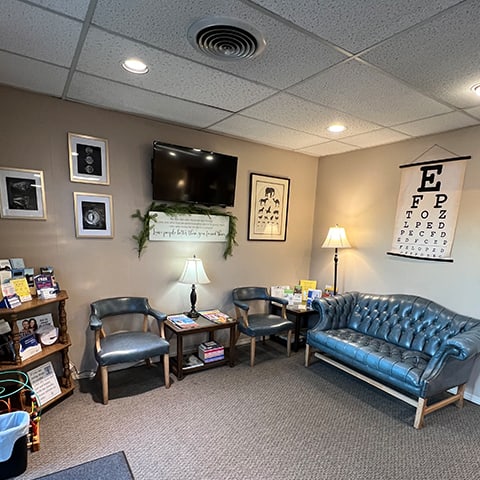Protect Your Vision From Diabetic Complications
Just over 1 in 10 Americans lives with diabetes—that’s more than 34 million people. Diabetes can impact your overall health, including your vision. That’s why we offer diabetic eye exams to help monitor your vision for possible issues.
Optometrists are specially positioned to assist with the diabetes epidemic. In many cases, it’s during an eye exam that the first signs of diabetes are detected.
People are often aware of the many ways that diabetes impacts overall health but don’t always consider its ocular impacts. Diabetes is a leading cause of blindness in adults.
People with diabetes are at an increased risk of developing eye diseases and conditions like glaucoma, cataracts, and diabetic retinopathy. We recommend that those with diabetes have annual, comprehensive eye exams. Taking a proactive approach to health is important, especially if you’re dealing with diabetes.
Book your diabetic eye appointment today, and let us help you preserve your sight.
Request Appointment
What Is Diabetes?
Diabetes is a disease that impacts the production of insulin, a hormone that regulates your body’s blood sugar levels.
When you eat, most of your food is broken down into glucose (sugar) and travels through the bloodstream. An increase in the amount of sugar in the bloodstream signals the pancreas to release insulin, which lets the sugar into your cells.
If you have diabetes, your body either does not make insulin or doesn’t use it properly.
Over time, elevated blood sugar levels can lead to various health issues, not the least of which include vision problems. Even if you don’t notice any change in your vision, it’s still important to have your eyes examined regularly. Book your appointment today.
Request AppointmentHow Does Diabetes Affect Vision?
Diabetes can lead to serious vision problems and even blindness, so it’s important to book an annual eye exam to check for any changes. Visual issues caused by diabetes may include the following.
Blurry Vision
When your body adjusts to diabetes medication or changes in your health routine, it can lead to blurry vision.
Elevated blood sugar can lead to a buildup of fluid in the eyes. Normally, the extra fluid is temporary, and your eyes will return to normal as your blood sugar stabilizes. But you should still visit your optometrist to rule out more serious issues.
Diabetic Retinopathy
Over half of people with diabetes may have retinopathy at some point. Diabetic retinopathy often progresses slowly and may not present visible symptoms until irreversible vision loss occurs. The blood vessels in your retina swell as blood sugar levels elevate.
In the early stages of diabetic retinopathy, blurry vision is a common symptom. As the condition progresses, it gets more serious. Blood vessels break and bleed, leaking into the macula and causing vision loss.
Diabetic Macular Edema
Diabetic macular edema occurs when the macula swells. The macula is responsible for your central vision, so impairment can impact the ability to read, write, drive, and recognize faces. This condition is quite serious and can lead to blindness.
Book Your Diabetic Eye Exam Today
If you have diabetes, it is imperative that you get your eyes examined regularly. Close examination of the retina can help to detect any early signs of serious vision problems.
During a diabetic eye exam, we may dilate your pupils to see the back of the eye and its structures more clearly. Dilation is a simple procedure: we place a few drops into the eyes, and the pupils widen temporarily.
You may be more sensitive to sunlight after a dilated eye exam, so we suggest bringing sunglasses to your appointment.
Request AppointmentCome Visit Us

Our Address
- 5910 S Lewis
- Tulsa, OK 74105
Contact Information
- Phone: 918-745-9700
- Fax: 918-743-8102
- Email: staff@adudleyod.com
Hours of Operation
- Monday: 8:30 AM – 5:30 PM
- Tuesday: 8:30 AM – 6:00 PM
- Wednesday: 8:30 AM – 5:30 PM
- Thursday: 8:30 AM – 5:30 PM
- Friday: 8:30 AM – 2:00 PM
- Saturday: Closed
- Sunday: Closed
Insurance & Payment Information
Dr. Dudley’s Primary Eye Care believes in providing the best value for you and your family. We have products and pricing that aims to accommodate all budgets and our office participates in most insurance programs. For patients who have little or no vision insurance coverage, flexible payment programs may be arranged. To learn more about our payment options, please call our office directly.
Vision Insurance
We accept several forms of vision insurance including:
- EyeMed
- Superior Vision
- Primary Vision Care Services (PVCS)
- Vision Care Direct
- Humana Vision
- Vision Service Plan (VSP)
- Care Credit
- And More
We are also provider for Medicare, several Blue Cross Blue Shield plans, BlueLincs HMO and United Health Care
*Please call our office with any insurance inquiries!
Flexible Spending & Savings Plans
- Flexible Spending Plans
- Health Savings Accounts (HSA)
- Medical Savings Accounts (MSA)
- Cafeteria Plans
All of the above plans can be used for all your eye care and eyewear needs, including eyeglasses, contact lenses, routine office visits and medical office visits.
Care Credit
The Care Credit card is available to help people pay for health care expenses, often with an introductory period that is interest-free. We accept Care Credit for all of our services. To learn more or apply, visit Care Credit here.
Our Services
Our Brands








Our Google Reviews
Our Blogs
Eye Exams: What to Expect
Eye Health and DiseasesYearly comprehensive eye exams are crucial to detecting changes in your vision and risk of eye-related diseases. We recommend adults have a comprehensive eye exam every year, and children should have an eye exam as early as six months before they start school, and then every 1-2 years. We often get questions about what to […]
Bifocal vs Progressive Lenses
Eye Health and DiseasesFor individuals that need vision correction both near and far, progressive or bifocal lenses are a must-have! As your eyes age and your vision changes, age-related farsightedness or presbyopia may start to affect your vision. What are Bifocal or Progressive Lenses? Progressive and bifocal lenses transition from near to far distance prescription within one lens! […]
6 Common Eye Symptoms and What to Do
Eye Health and DiseasesSuffering from eye discomfort or blurry vision can be scary, especially if it comes on suddenly or is a result of a dramatic event. Below are some of the common eye-related disorders. However, remember that common doesn’t mean it should be ignored. If you are experiencing any of these systems or if you have questions […]
Eye Exams: What to Expect

Yearly comprehensive eye exams are crucial to detecting changes in your vision and risk of eye-related diseases. We recommend adults have a comprehensive eye exam every year, and children should have an eye exam as early as six months before they start school, and then every 1-2 years. We often get questions about what to […]
Bifocal vs Progressive Lenses

For individuals that need vision correction both near and far, progressive or bifocal lenses are a must-have! As your eyes age and your vision changes, age-related farsightedness or presbyopia may start to affect your vision. What are Bifocal or Progressive Lenses? Progressive and bifocal lenses transition from near to far distance prescription within one lens! […]
6 Common Eye Symptoms and What to Do

Suffering from eye discomfort or blurry vision can be scary, especially if it comes on suddenly or is a result of a dramatic event. Below are some of the common eye-related disorders. However, remember that common doesn’t mean it should be ignored. If you are experiencing any of these systems or if you have questions […]









